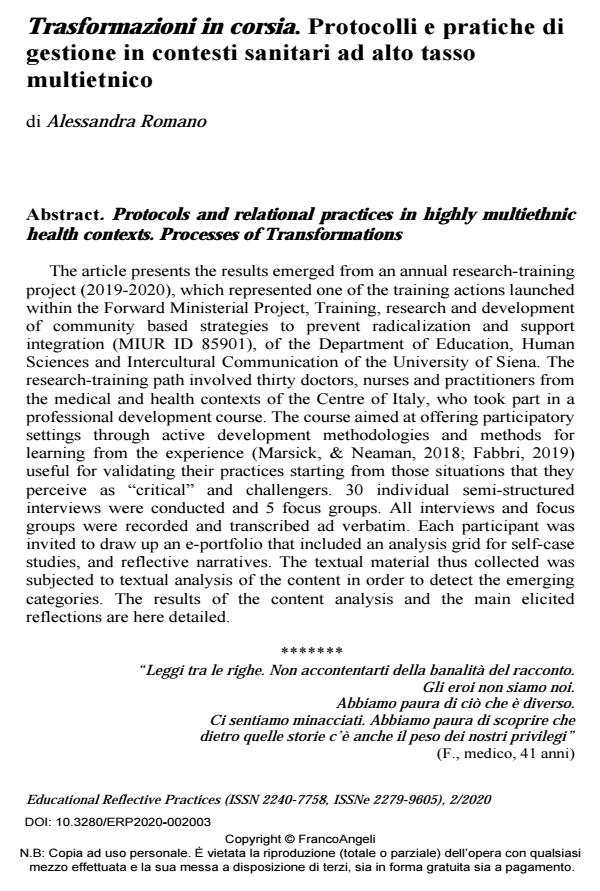Trasformazioni in corsia. Protocolli e pratiche di gestione in contesti sanitari ad alto tasso multietnico
Titolo Rivista EDUCATIONAL REFLECTIVE PRACTICES
Autori/Curatori Alessandra Romano
Anno di pubblicazione 2021 Fascicolo 2020/2
Lingua Italiano Numero pagine 32 P. 54-85 Dimensione file 457 KB
DOI 10.3280/ERP2020-002003
Il DOI è il codice a barre della proprietà intellettuale: per saperne di più
clicca qui
Qui sotto puoi vedere in anteprima la prima pagina di questo articolo.
Se questo articolo ti interessa, lo puoi acquistare (e scaricare in formato pdf) seguendo le facili indicazioni per acquistare il download credit. Acquista Download Credits per scaricare questo Articolo in formato PDF

FrancoAngeli è membro della Publishers International Linking Association, Inc (PILA), associazione indipendente e non profit per facilitare (attraverso i servizi tecnologici implementati da CrossRef.org) l’accesso degli studiosi ai contenuti digitali nelle pubblicazioni professionali e scientifiche.
The article presents the results emerged from an annual research-training project (2019-2020), which represented one of the training actions launched within the Forward Ministerial Project, Training, research and development of community based strategies to prevent radicalization and support integration (MIUR ID 85901), of the Department of Education, Human Sciences and Intercultural Communication of the University of Siena. The research-training path involved thirty doctors, nurses and practitioners from the medical and health contexts of the Centre of Italy, who took part in a professional development course. The course aimed at offering participatory settings through active development methodologies and methods for learning from the experience (Marsick, & Neaman, 2018; Fabbri, 2019) useful for validating their practices starting from those situations that they perceive as "critical" and challengers. 30 individual semi-structured interviews were conducted and 5 focus groups. All interviews and focus groups were recorded and transcribed ad verbatim. Each participant was invited to draw up an e-portfolio that included an analysis grid for self-case studies, and reflective narratives. The textual material thus collected was subjected to textual analysis of the content in order to detect the emerging categories. The results of the content analysis and the main elicited reflections are here detailed.
- Processi di radicalizzazione e prospettive trasformative Loretta Fabbri, Alessandra Romano, in EDUCATIONAL REFLECTIVE PRACTICES 1/2021 pp.8
DOI: 10.3280/erp1-special-2021oa12448
Alessandra Romano, Trasformazioni in corsia. Protocolli e pratiche di gestione in contesti sanitari ad alto tasso multietnico in "EDUCATIONAL REFLECTIVE PRACTICES" 2/2020, pp 54-85, DOI: 10.3280/ERP2020-002003